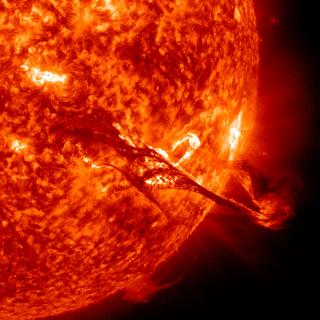Bibcode
Puschmann, K. G.; Denker, C.; Kneer, F.; Al Erdogan, N.; Balthasar, H.; Bauer, S. M.; Beck, C.; Bello González, N.; Collados, M.; Hahn, T.; Hirzberger, J.; Hofmann, A.; Louis, R. E.; Nicklas, H.; Okunev, O.; Martínez Pillet, V.; Popow, E.; Seelemann, T.; Volkmer, R.; Wittmann, A. D.; Woche, M.
Bibliographical reference
Astronomische Nachrichten, Vol.333, Issue 9, p.880
Advertised on:
11
2012
Citations
74
Refereed citations
58
Description
The GREGOR Fabry-Pérot Interferometer (GFPI) is one of three
first-light instruments of the German 1.5-meter GREGOR solar telescope
at the Observatorio del Teide, Tenerife, Spain. The GFPI uses two
tunable etalons in collimated mounting. Thanks to its large-format,
high-cadence CCD detectors with sophisticated computer hard- and
software it is capable of scanning spectral lines with a cadence that is
sufficient to capture the dynamic evolution of the solar atmosphere. The
field-of-view (FOV) of 50 arcsec × 38 arcsec is well suited for
quiet Sun and sunspot observations. However, in the vector
spectropolarimetric mode the FOV reduces to 25 arcsec ×
38 arcsec. The spectral coverage in the spectroscopic mode extends from
530-860 nm with a theoretical spectral resolution of R ≈ 250,000,
whereas in the vector spectropolarimetric mode the wavelength
range is at present limited to 580-660 nm. The combination of fast
narrow-band imaging and post-factum image restoration has the potential
for discovery science concerning the dynamic Sun and its magnetic field
at spatial scales down to ˜50 km on the solar surface.
Related projects

Solar and Stellar Magnetism
Magnetic fields are at the base of star formation and stellar structure and evolution. When stars are born, magnetic fields brake the rotation during the collapse of the mollecular cloud. In the end of the life of a star, magnetic fields can play a key role in the form of the strong winds that lead to the last stages of stellar evolution. During
Carlos Cristo
Quintero Noda